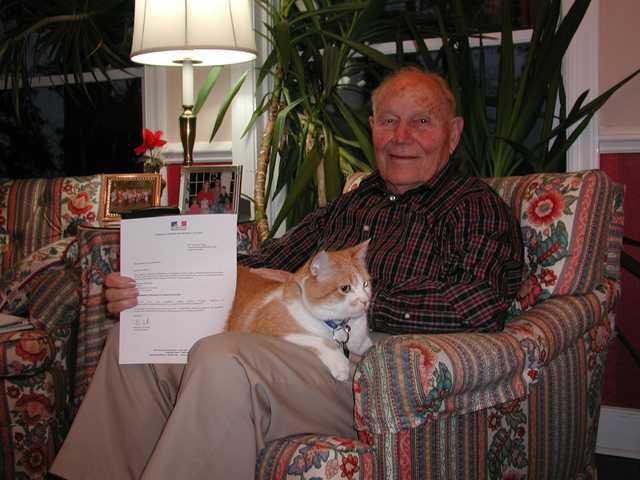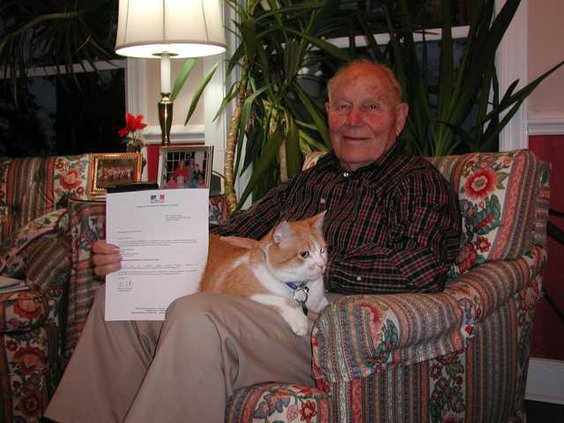When Townsend resident and World War II veteran Harold Hicks, 92, recounts his war experiences, it’s like having someone read a historical novel aloud. Hicks appears thoughtful, friendly and keenly focused. A retired research chemist, he says he still strives to "help out when I can."
Hicks’ heroism, sacrifice and contributions to preserving democracy were remembered Thursday when the French consul general in Atlanta awarded him France’s highest accolade: the Legion of Honor.
The Shellman Bluff resident joined 10 other Georgia veterans and one Alabama veteran for the award ceremony Thursday afternoon at the Lenox Building in
Atlanta.
"It’s an honor and a pleasure to see these wonderful men; it’s very moving. The ceremony is really something extraordinary," Consul General Pascal Le Deunff said in a telephone interview Tuesday.
The decision to award France’s most distinguished honor was made "a long time ago," Le Deunff explained.
"We accelerated the process because of the advanced age of the veterans," he said. The consul general said the veterans submitted documents to the French government proving they fought in French territory and contributed to the liberation of France during World War II. The application process was handled years ago by the French embassy in Washington, D.C., but is now handled by France’s regional consulates.
"Thanks to the media, each time I give this award in Atlanta or elsewhere in the Southeast, it goes on television and in the papers, and in the days after, we receive more documents from new veterans we didn’t know before," Le Deunff said. "I have 150 documents still to process — just in the Southeast. Since we are here in Atlanta, our proximity to these veterans has made it easier for them to come to us."
Hicks served in the 62nd Coast Artillery Regiment, which was an antiaircraft unit based at Fort Totten, N.Y.
"I served under Maj. Gen. George Patton," Hicks said. He also participated in eight of the 3rd Infantry Division’s 10 campaigns of World War II. And, at the end of his war service, he helped liberate Dachau concentration camp.
Heading for ‘points unknown’
Hicks recalls with a smile how he had to ask for a three-day leave just to get married when he first was activated in September 1941.
"Our honeymoon was a 24-hour coach (train) ride from Minneapolis to Chicago to New York," he said.
The quiet veteran’s combat experiences began soon after he landed in England in 1942 for training.
"The crossing of the ocean, we didn’t think too much about it," he said. Hicks said he and the other young soldiers realized the danger they were in after they saw one ship disappear, likely to a German submarine.
From England, his unit was shipped out to North Africa for Invasion Operation Torch.
Hicks, a Dogface soldier, pressed on with the 3rd ID east into Tunisia and then into Italy, landing in Sicily first, and then pressing on into Palermo and Messina and then Salerno and Rome.
From there, Hicks’ unit moved into southern France, near Marseilles.
"We went in with the free French," he said.
Hicks said the French were hospitable and, for the most part, kind, despite being displaced due to the war. He was taken under the wing of one prominent French family, who saw the likeness of their dead son in Hicks’ 25-year-old face.
"They wanted to adopt me," Hicks said. He said he told them as gently as he could that he could not stay.
"I had a wife and daughter waiting for me back home," Hicks said.
After his time in sunny France, Hicks and his unit continued to press on. From there, they went into Germany.
Dachau
Hicks’ expression visibly changed when he spoke about liberating one of Nazi Germany’s death camps. The pain of his experiences flitted across his face like dappled sunlight.
"I had three years or more of combat duty, but it didn’t prepare me at all for Dachau," he said. "There’s no way to describe how horrible that was."
Hicks said he will never understand the inhumanity he witnessed, nor why Germany, which had been a pre-eminent and intellectual beacon of Europe, could stoop so low as to plan and carry out the Holocaust.
"The stench was almost unbreathable," he said. "Corpses were stacked like cord wood. Thank goodness we got there when we did."
Hicks said the Americans prevented additional murders by the SS guards, who were holding contests to see who could fatally shoot the most Jews before the Allies arrived.
According to www.jewishvirtuallibrary.org, the American soldiers found 32,000 prisoners in Dachau. The camp had 20 barracks, each crammed with about 1,600 prisoners. These buildings should have held no more than 250 people each.
Hicks said he now hopes to speak to more school and civic groups about his wartime experiences.
"It’s amazing how many people have never heard of the Holocaust," he said.
Hicks said the United States continues to promote democracy in other parts of the world, such as Iraq and Afghanistan. He said what set the U.S. apart from most other nations is America didn’t fight wars to take territory, but entered conflicts to help other countries in distress.

